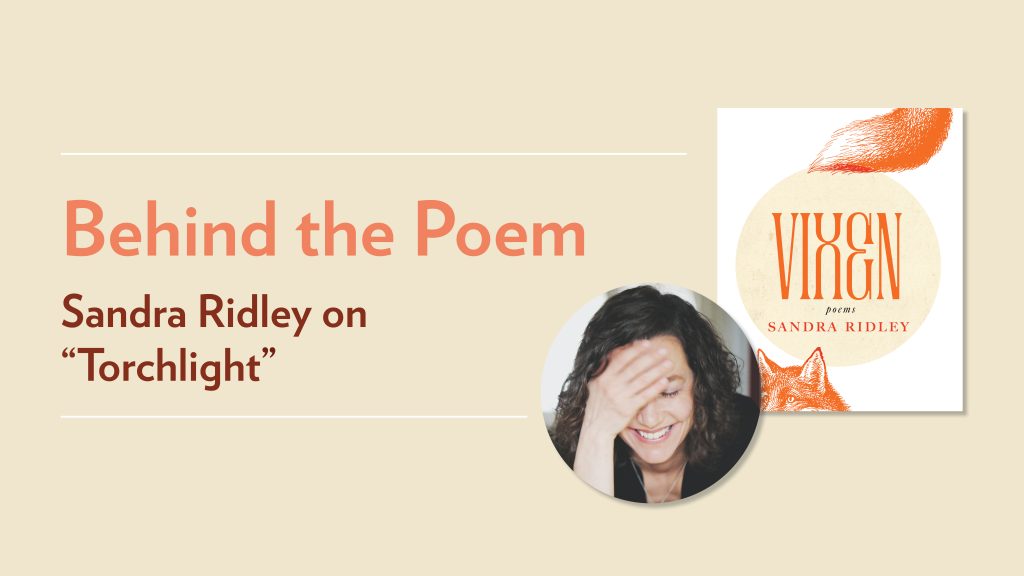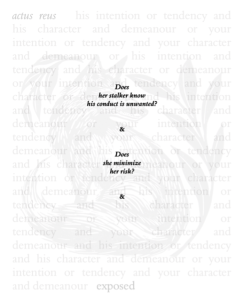Behind the Poem with Sandra Ridley

Today, Sandra Ridley is taking us behind “Torchlight,” a poem from Vixen!
Torchlight, as in an illumination in the dark. As experienced by the one who holds the torch? Or as experienced by the one caught in its light? The centered visual element of each page of this sequence in Vixen is the beam of light through the dark, but also what the beam exposes.
Before I found an image of printmaker Cally Conway’s linocut fox, “Torchlight” existed as only the top layer text, the foregrounded, italicized aspect—what gleams from the vixen’s eye. These phrases come from the lexicon of law enforcement and criminal “justice” systems.

The sequence’s form unites three layers.
The bottom layer, the wallpapered background text, works as atmosphere. The landscape of experience. The ambient murk. The gloaming of inner whisperings, outer judgements, tenets regarding criminal harassment and dogmas from the criminal code. Like lived experience, the text has gradation, with fading and intensifying colors: light grey, grey, black. The text also uses repetition to echo how the pattern of intimate partner violence tends to repeat. And because startling, significant events are spot lit (or jacklit) in one’s life, so are specific words and phrases.
The mid-ground centered piece is Conway’s fox as vixen watermark.
Medieval illuminated manuscripts, bestiaries in particular, influenced my writing in Vixen. Seeing Conway’s independent, heraldic figure of the fox—majestic in her habitat, havened by a natural, botanical border—Conway’s piece seems to me to have come from similar sources. I felt her fox could be my vixen.
As survivor.
As harbinger.
If a reader tries to look the vixen in the eye, she gives back a fierce textual gleam.
The vixen of this sequence is whole. Unlike elsewhere in the book where the vixen and kindred species exist in pieces, in parts, where “any part of any creature will be taken for the whole.” Each creature with its trembling particularities.
And this vixen is focal. Whatever is happening in the background or foreground on the page, as in life, there is always a magnificent creature, a living being, at the centre.
____________________________________________________________________________________________
Sandra Ridley is the author of four books of poetry: Fallout; Post-Apothecary; The Counting House; and Silvija, a finalist for the 2017 Griffin Poetry Prize. She has won the bpNichol Chapbook Award, Saskatchewan Book Award for Publishing, the Alfred G. Bailey Prize, and the Toronto International Festival of Authors’ Battle of the Bards. Additionally, she has been a finalist for the Banff Centre Bliss Carman Poetry Award, the Ottawa Book Award, the Archibald Lampman Award, the ReLit Award for Poetry, and the Robert Kroetsch Award for Innovative Poetry. She has also been nominated for the Ontario Arts Council’s KM Hunter Artist Award for Mid-Career Writer and for the Ottawa Arts Council’s Mid-Career Artist Award. Ridley has taught poetry at Sage Hill Writing, Carleton University, and has had the honour of being a mentor with Ottawa’s Supportive Housing and Mental Health Services “Footprints to Recovery” program for people living with mental illness. An audio performance of her chapbook “Lift” was presented on CBC’s Sound Exchange. Her work has been anthologized and translated into German and French. Sandra grew up on a farm in Saskatchewan and lives in Ottawa.

